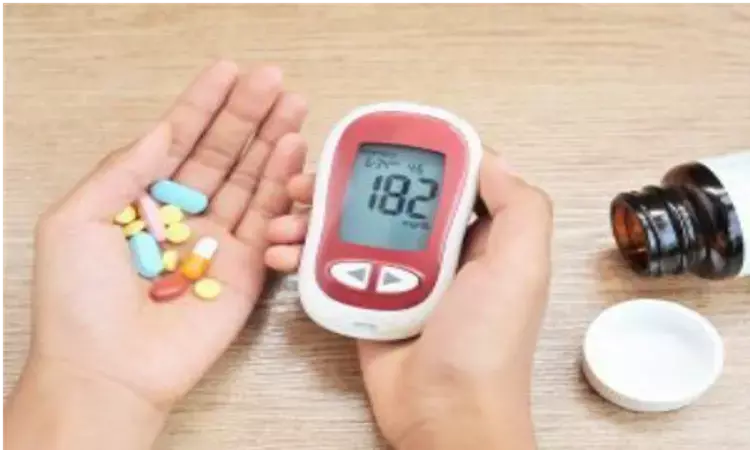- Home
- Medical news & Guidelines
- Anesthesiology
- Cardiology and CTVS
- Critical Care
- Dentistry
- Dermatology
- Diabetes and Endocrinology
- ENT
- Gastroenterology
- Medicine
- Nephrology
- Neurology
- Obstretics-Gynaecology
- Oncology
- Ophthalmology
- Orthopaedics
- Pediatrics-Neonatology
- Psychiatry
- Pulmonology
- Radiology
- Surgery
- Urology
- Laboratory Medicine
- Diet
- Nursing
- Paramedical
- Physiotherapy
- Health news
- Fact Check
- Bone Health Fact Check
- Brain Health Fact Check
- Cancer Related Fact Check
- Child Care Fact Check
- Dental and oral health fact check
- Diabetes and metabolic health fact check
- Diet and Nutrition Fact Check
- Eye and ENT Care Fact Check
- Fitness fact check
- Gut health fact check
- Heart health fact check
- Kidney health fact check
- Medical education fact check
- Men's health fact check
- Respiratory fact check
- Skin and hair care fact check
- Vaccine and Immunization fact check
- Women's health fact check
- AYUSH
- State News
- Andaman and Nicobar Islands
- Andhra Pradesh
- Arunachal Pradesh
- Assam
- Bihar
- Chandigarh
- Chattisgarh
- Dadra and Nagar Haveli
- Daman and Diu
- Delhi
- Goa
- Gujarat
- Haryana
- Himachal Pradesh
- Jammu & Kashmir
- Jharkhand
- Karnataka
- Kerala
- Ladakh
- Lakshadweep
- Madhya Pradesh
- Maharashtra
- Manipur
- Meghalaya
- Mizoram
- Nagaland
- Odisha
- Puducherry
- Punjab
- Rajasthan
- Sikkim
- Tamil Nadu
- Telangana
- Tripura
- Uttar Pradesh
- Uttrakhand
- West Bengal
- Medical Education
- Industry
Tirzepatide bests insulin degludec for achieving blood sugar targets in type 2 diabetes: Lancet

USA: Once-weekly treatment with tirzepatide compared to insulin degludec led to superior glycemic control in patients with type 2 diabetes (T2D) on metformin, with or without an SGLT2 inhibitor, says a recent study published in The Lancet Diabetes & Endocrinology.
The findings provide additional evidence to the effect and potential of tirzepatide for achieving glycemic targets without increasing hypoglycemia risk versus basal insulin.
Tirzepatide, a novel dual glucose-dependent insulinotropic polypeptide (GIP) and GLP-1 receptor agonist, is under development for type 2 diabetes treatment. In the study, Katelyn Brown, Eli Lilly and Company, Indianapolis, IN, USA, and colleagues aimed to compare the 24 h glucose profile of participants given tirzepatide compared with those who were given insulin degludec using continuous glucose monitoring (CGM).
For this purpose, the researchers performed a substudy of the open-label, parallel-group, phase 3 SURPASS-3 trial at 45 sites across six countries. Eligible participants in the main study were adults with type 2 diabetes, a baseline HbA1c of 7·0–10·5% (53–91 mmol/mol), and a BMI of 25 kg/m2 or more, who were insulin-naive, and treated with metformin alone or in combination with an SGLT2 inhibitor for at least 3 months before screening.
People in the main study were randomly assigned in the ratio of 1:1:1:1 to receive a once-weekly subcutaneous injection of tirzepatide 5 mg, 10 mg, or 15 mg, or a once-daily subcutaneous injection of titrated insulin degludec (100 U/mL).
The substudy enrolled a subset of these patients with a normal wake-sleep cycle, and interstitial glucose values were collected by CGM for approximately 7 days at baseline, 24 weeks, and 52 weeks.
The primary outcome compared pooled participants assigned to 10 mg and 15 mg tirzepatide versus insulin degludec for the proportion of time that CGM values were in the tight target range (71 - 140 mg/dL) at 52 weeks. The secondary outcome compared tirzepatide (5 mg, 10 mg, and 15 mg) versus insulin degludec for the proportion and duration of time in the tight target range at 24 and 52 weeks.
313 participants were screened for eligibility from April 1 to Nov 27, 2019, 243 of whom were enrolled in CGM substudy (tirzepatide 5 mg, n=64; tirzepatide 10 mg, n=51; tirzepatide 15 mg, n=73; and insulin degludec, n=55).
Based on the study, the researchers reported the following findings:
- Patients given once-weekly tirzepatide (pooled 10 mg and 15 mg groups) had a greater proportion of time in a tight target range compared with patients given insulin degludec.
- Participants assigned to tirzepatide spent significantly more time in the tight target range at 52 weeks compared with those assigned to insulin degludec (5 mg 12%; 10 mg 24%; and 15 mg 25%).
- Participants assigned to tirzepatide 10 mg and 15 mg, but not to tirzepatide 5 mg, spent significantly more time in a tight target range at 24 weeks compared with insulin degludec (10 mg 19%; 15 mg 21%).
"Once-weekly treatment with tirzepatide showed superior glycaemic control measured using CGM versus insulin degludec in people with type 2 diabetes on metformin, with or without an SGLT2 inhibitor," wrote the authors.
"Findings provide additional evidence of the effect of tirzepatide and the potential for achieving blood sugar targets without an increase of hypoglycaemic risk compared with basal insulin," they concluded.
Reference:
The study titled, "Efficacy of once-weekly tirzepatide versus once-daily insulin degludec on glycaemic control measured by continuous glucose monitoring in adults with type 2 diabetes (SURPASS-3 CGM): a substudy of the randomised, open-label, parallel-group, phase 3 SURPASS-3 trial," was published in The Lancet Diabetes & Endocrinology.
Dr Kamal Kant Kohli-MBBS, DTCD- a chest specialist with more than 30 years of practice and a flair for writing clinical articles, Dr Kamal Kant Kohli joined Medical Dialogues as a Chief Editor of Medical News. Besides writing articles, as an editor, he proofreads and verifies all the medical content published on Medical Dialogues including those coming from journals, studies,medical conferences,guidelines etc. Email: drkohli@medicaldialogues.in. Contact no. 011-43720751


